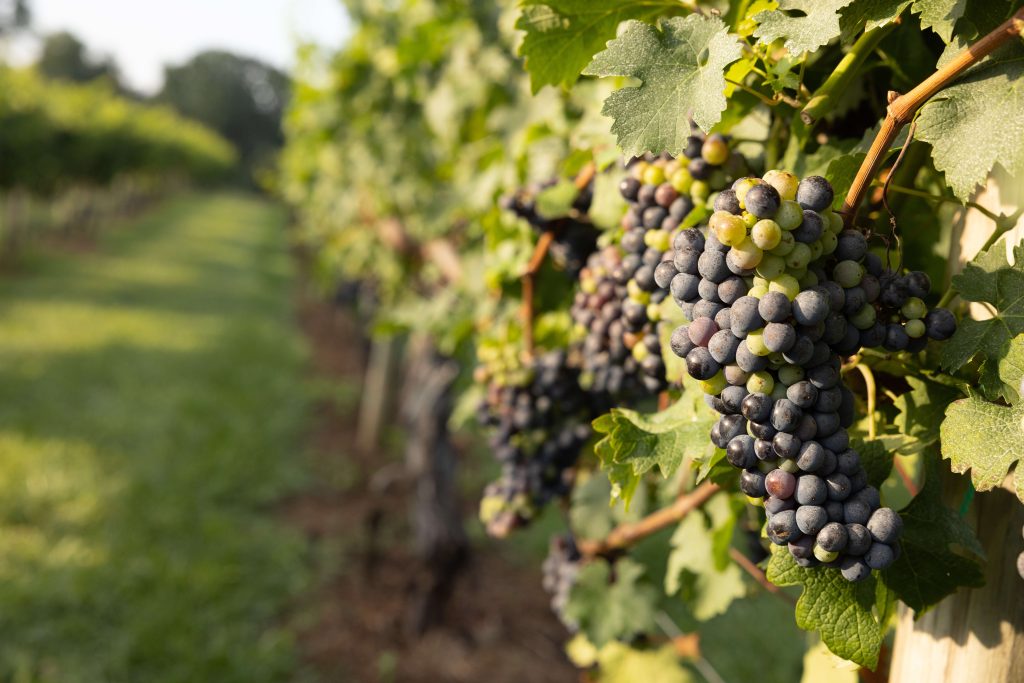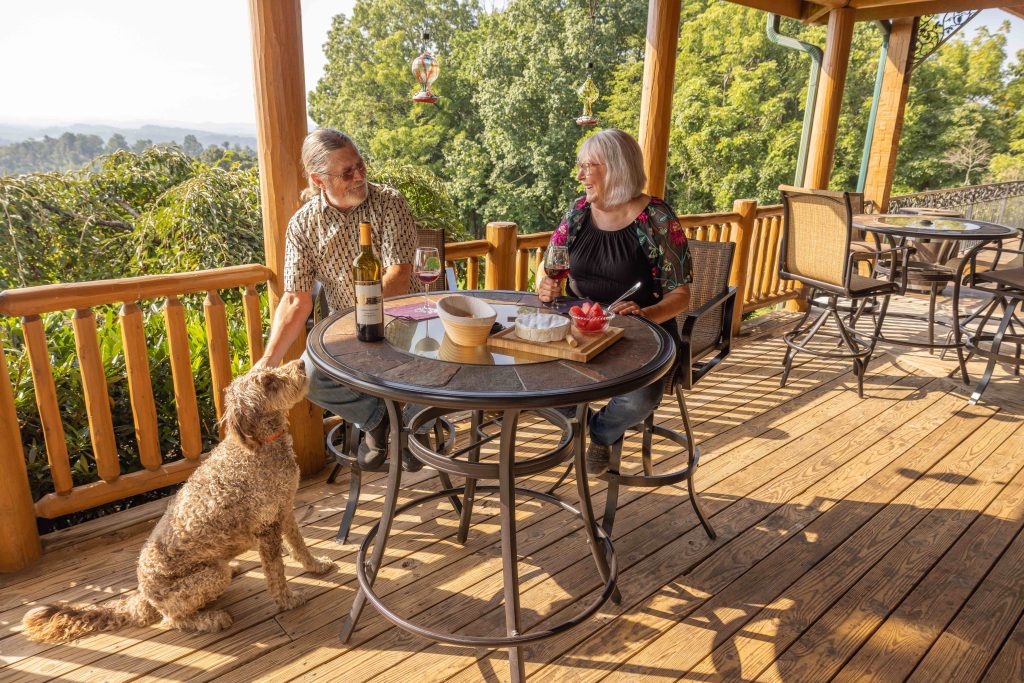Spout Spring Estates keeps Viticulture Thriving in East Tennessee
Anytime I step onto the grounds of a local winery, I find myself having flashback moments. Life at the winery was just a blink in my personal timeline, but it’s one I will never forget. As a tasting room specialist at a tiny family-owned winery, I relished the moments caring for the vines and walking interested patrons through the aromas they might encounter in the wines they were tasting. And while I was a fresh college graduate, even I could sense how much each person’s struggles and daily stressors would just melt away when they arrived to sample the carefully crafted flavors. That feeling is without a doubt felt at Spout Spring Estates in Blaine. Chuck and Alice Belt make sure of it.
The Retiree’s Legacy
I find it fascinating that this legacy Chuck and Alice have built here was not always their life’s work. “Chuck and I are both mechanical engineers,” Alice admits to me. “We lived in West Knoxville, and we were going to retire, but we couldn’t decide what to do.”
The options were to buy an ocean-worthy boat or buy a farm. And while one might think they would opt for the more whimsical of the two, they bought the farm. This was back in 2004. “Even if you’re retired, you have to do something,” Alice jokes. And so after some internet research and finding out “before Prohibition, Tennessee grew more grapes than we even do today,” they settled on growing grapes.
Still living in Knoxville, the two planned to plant an acre of grapes a year on their Granger County farm, but quickly found out that you cannot care for two acres of grapes just on the weekends. So they moved to the property in 2006 and continued planting.
Learning the ins and outs of viticulture is no easy feat, and there are most certainly experts that any winemaker will call out in their travels. For Chuck and Alice, they studied cultivation with the University of California and utilized materials from the University of Pennsylvania. They joined viticulture organizations and the local Tennessee Farm Winegrowers Alliance. But they also connected themselves with mentors, particularly Troy and Connie Perrin, Memphis-based viticulturists. “We went down and introduced ourselves to them, and they said, ‘Don’t do it. It’s too much work,’” Alice says, “but we did it anyway.”

I find myself identifying with Alice and Chuck the more we talk. They ran toward the challenge. And rather than take the retired life of ease, the two—who lovingly refer to themselves as “stubborn” and “hard-nosed”—decided they wanted this enough that enduring the hard work was just the step they needed to take. “We found out that they were telling us the truth,” Chuck says. “It’s a lot of work, hard work. It’s something you should start doing when you’re younger, much younger.”
They sold their grapes to a local wine group in Pigeon Forge in those early years and made wine out of their garage—“You’re allowed to make 100 gallons a person without having a license,” Alice says. But in 2012, Tennessee passed the Tennessee Farm Winery Law which made it possible to take your grapes to a licensed winery where they would make your wine, put your label on it, and sell it at your farm. And so Alice and Chuck jumped on board. “We did that for a couple years to just see if we would have enough business, before we made all the investment in the winery equipment.”
Turns out, people liked it, and so the duo jumped in to winemaking and began plans to open their winery. Chuck is modest when he talks about the process. “A lot of people try to make it out that it’s really complicated, and they are real secretive about it,” he says. “But it’s not rocket science. It’s a natural process that will take place whether you do anything or not, but as long as you start out with really good grapes, it’s kind of hard to mess it up. It’s 10 percent wine making and 90 percent cleaning and sanitizing and monitoring and testing.” Alice agrees, but is quick to call out the intricacies necessary that Chuck has mastered at this point as the winery’s winemaker.
All In
Deciding to bring people to the farm was not as big a leap as you might imagine for Chuck and Alice. Even before they opened the winery, they had already been welcoming people to the farm by booking it out for weddings. They eventually got to the point where they were doing upwards of 130 weddings a year at the property.
But with a thriving winery business, Alice says there’s just not enough time to commit to both. So they are officially leaving the wedding business behind and committing full force to there winery and vineyards.
The pavilion they built on the property was the perfect space to convert to the winery. There they process grapes, create their wine, bottle and label, all on site. They also created a retail space to sell and provide tastings. “After a few years of working with a very small tasting room, we expanded that and made it a much larger tasting room and started adding tables and chairs for more people outside,” Chuck says. Winery goers often bring lunch and spend all afternoon outside at the winery, a welcome sight for Chuck and Alice.

Today, they care for 4,500 vines in their six-acre-vineyard, and they have a tenured team who help them do it. Once grapes are picked, they go through a detailed process right on site, from de-stemming and pressing the juice right through to finishing a wine before bottling. “We barrel age all of our red wines and one of our whites,” Chuck says, Alice adding that a red could take up to three years before it’s bottled. Then again, there are white wines that can be bottled within six months.
“We grow the Nefra, which are referred to most often as the noble varieties,” Chuck explains. “That would be Cabernet Sauvignon, which is a Bordeaux. Sangiovese, which is Italian. Riesling, which is German. Chardonnay, which is a Burgundian grape. And a little bit of Muscadine, just because we have to.” Tennesseans love Muscadine wine. So in 2014, after many asks from their patrons, Chuck and Alice planted the grapes.
“It’s a Lifestyle”
There are still only about 70 wineries that call the state of Tennessee home; the state’s wine industry seems to still be in its infancy. However, that number has about tripled in the last two decades.
“Recently, we got the state to establish a grape and wine board and they have been really good about coming forward with taking some of the tax money that the wineries pay in and funding some different programs to help support the industry. That just started happening probably within the last five years,” Chuck says, adding that he feels it’s a good investment for the state. “I think they’re finally discovering that that’s the case.”
In March of 2020, Chuck put up a map of the world in the Spout Spring Estates tasting room and asked patrons to place a pin in the map to mark the place they were born. Two years later, that map has pins in every continent. Speaking to other winery owners in the region, they tell similar stories. The appreciation of good wine is not beholden to a certain place or age group or culture. It is a culture all on its own and as Alice says, “The culture of wine is more than just a job or a product. It’s a lifestyle.”
